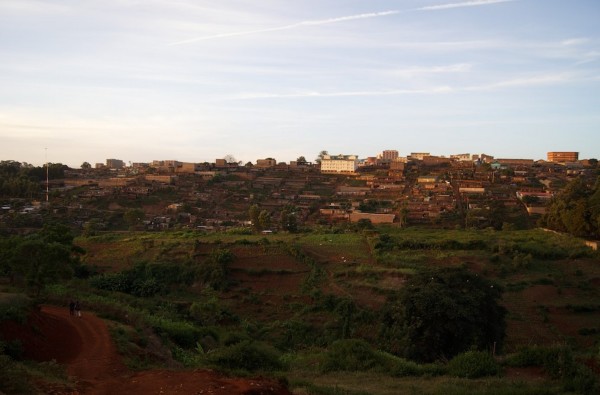There is a huge storm of dust in Nyeri and Kenya’s other heralded coffee-growing regions that is nowhere near settled, as a new government-led program that purports transparency and agricultural growth threatens existing relationships and leaves some buyers doubting.
This past season’s centralization of milling in Nyeri is just the beginning of a regional oversight program for coffee trade among a number of the country’s primary growing regions, including Kiambu, Meru, Murang’a and Kirinyaga.
(more: A Huge Step Forward for Fine Robusta. Is the Specialty Coffee Market Ready?)
In addition, Nyeri county and federal agricultural leaders told Daily Coffee News that this past season’s mandate that all Nyeri coffees to be processed at a central mill in Sagana was a one-time-only requirement, and buyers will be allowed to negotiate directly with individual farming societies and other mills in the years moving forward, with price verification from county governments.
“If you want to do a direct trade, we can facilitate it,” Nyeri Governor Nderitu Gachagua told a room full of buyers at the recent SCAA Event in Seattle.
The oversight plan has been criticized by numerous high-profile buyers who have in previous years maintained direct relationships with individual mills and societies that have been known to produce some of the world’s best coffees. They question Kenya’s long history of political corruption in the agricultural sector, as well as the potential loss of transparency due to government interference. (It is worth noting that the county governance system is new to Kenya since 2010, after years of federal-level corruption and requests for a more democratic system led to constitutional reform).
Nyeri millers and individual farming societies in Kenya have also suggested that the centralization plan was illegal and resulted in trade losses with devastating effects throughout the supply chain this year.
(more: When Quality Falls Short: Exploring Risk in the High-End Specialty Trade)
Governors in the coffee-growing counties, meanwhile, say the program is a response to several years straight of declining exports and prices, and marketing and licensing collusion among a small number of cartels have resulted in an estimated 30 percent in coffee losses from mills. Additionally, there have been steady production declines throughout Nyeri and other parts of Kenya, as the average age of farmers increases and as production costs rise.
“As of next year there will be a regulatory framework, so any mill can sell coffee, but there will be oversight to make sure they are getting the best prices,” Stan Miano, the executive secretary of trade for Nyeri County, said. “Prices have been high for Nyeri coffee, but unfortunately those prices are not getting to the farmer.”
In a signed statement, the governors in Meru, Nyeri, Kiambu, Kirinyaga and Murang’a outlined what Miano described to Daily Coffee News as a “hostage situation” among farmers:
The Coffee Amendment Act (2001) put an end to the practice of holding multiple licenses by individual players for milling, marketing and buying of coffee. It also opened a second window for marketing of clean coffee directly outside the Nairobi Coffee Exchange. However, there has been collusion between the players and licensing agencies to circumvent the system. Sadly, today we have players who own multiple coffee licenses, thus accessing coffee from cooperative societies illegally by mortgaging the crop in advance. Of major concern is the huge indebtedness of the smallholder coffee farmers, leaving the mother cooperatives highly exposed, and some virtually insolvent.
At the SCAA meeting, Gov. Gachagua acknowledged that this past season’s centralization mandate — which, in effect, shut down numerous longstanding individual mills in Nyeri — may have been too hasty, as it negatively affected relationships between individual mills and legitimate third-party buyers who may actually pay premiums for quality coffees.
“We are learning that in this coffee business, relationships are everything,” he said, adding, “It is not our intention as a country government to get involved in the nitty gritty of coffee trading.”
(more: ICO Outlines the Drivers and Restrainers of Coffee Farmer Aggregation)
That said, a large number of people in the room — which looked like a who’s who-of high-end buyers and roasters — remained skeptical, especially after sore feelings from what for many was a lot opportunity for quality lots in Nyeri this year. Oslo-based Tim Wendelboe, who annually publishes a traceability and transparency report on the coffees he buys directly, questioned the Governor’s stated goal of transparency following this year’s milling centralization.
“You’re saying the coffees are being sold, but can you tell us at what prices?” he asked. “Are they higher than they have been before?”
Gov. Gachagua merely said, “It is moving and it is moving well,” declining offering specific numbers.
After the meeting, Wendelboe told Daily Coffee News, “If I am to believe what they are saying in there, then they are admitting they did some things wrong and they want to fix it. But we’ll have to see what happens.” He later added, “I hope at least whatever happens, it will benefit the farmers in the end. But I fear that the farmers once again will be the victims of poorly executed politics.”
Green coffee buyer Tim O’Brien of The Green Coffee Vault and Cafetin Roasting Company, introduced the Kenyan government representatives at the SCAA meeting. He told Daily Coffee News that it would be “a shame” for buyers to give up on Nyeri after this year’s controversy, suggesting that would only hurt farmers and diminish what has been fertile ground for some of the world’s best coffees.
“Please don’t abandon this coffee, because that’s not in anybody’s interest,” said O’Brien, adding that his recent visits to Nyeri confirmed the idea that smallholder farmers there are suffering, despite past and occasional premiums paid to mills. “They were literally telling me they can’t suffer anymore than they’ve already suffered. Something has to change.”
Nick Brown
Nick Brown is the editor of Daily Coffee News by Roast Magazine.







Comment